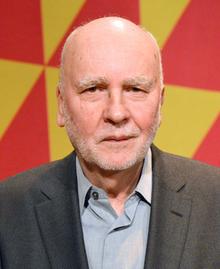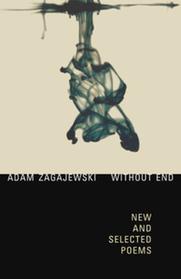When I first heard the poet read, at a small event during the summer of 2001, I didn't know his work at all. As soon as he began, however, I leaned into those words to receive the brunt, the wave, the wash of images, the sound of lines forged and bent in unlikely combinations ("A poem grows/ on contradiction but can't cover it.") that felt as fresh and inevitable as water down a hill (Europe's "coarse plaid of borders" or clouds that "swim on their backs,/ gazing calmly at the sun.").

|
|
| Adam Zagajewski in 2014. | |
Adam Zagajewski died March 21. He was 75. The New York Times described him as a "poet and a former dissident in exile whose life and verse reverberated with laments over displacement and reminders that the past perseveres," and noted that he had "taught at the University of Houston and the University of Chicago, wrote several collections of poems and essays, and returned to Krakow in 2002, with his wife, the actress and translator Maja Wodecka."
Also mentioned was the fact that shortly after the 2001 terrorist attacks on the World Trade Center and the Pentagon, the New Yorker had published, on the issue's last page, his prescient poem, "Try to Praise the Mutilated World," written a few months earlier and translated by Clare Cavanagh.
 Obituaries listed some of Zagajewski's books: Mysticism for Beginners (1997), Without End: New and Selected Poems (2002), Eternal Enemies: Poems (2008), Asymmetry: Poems (2018), Another Beauty (2000), Slight Exaggeration: An Essay (2017), all translated by Cavanagh; along with Solitude and Solidarity (1990) and Two Cities (1995), translated by Lillian Vallee. His honors were also noted, including the Prix de la Liberté, the Neustadt International Prize for Literature and the Princess of Asturias Award.
Obituaries listed some of Zagajewski's books: Mysticism for Beginners (1997), Without End: New and Selected Poems (2002), Eternal Enemies: Poems (2008), Asymmetry: Poems (2018), Another Beauty (2000), Slight Exaggeration: An Essay (2017), all translated by Cavanagh; along with Solitude and Solidarity (1990) and Two Cities (1995), translated by Lillian Vallee. His honors were also noted, including the Prix de la Liberté, the Neustadt International Prize for Literature and the Princess of Asturias Award.
These are all facts. But two decades ago, when I first listened to this stranger, Zagajewski, read, I heard a sketchbook of his work and wanted more. Soon after, as I began reading him, the sketches filled with color, hazy borders were framed, outlines of images came alive, the words irresistible in their knife-edged engagement with, and disengagement from, a mad and beautiful world.
His poem "Dutch Painters" begins with "Pewter bowls heavy and swelling with metal./ Plump windows bulging from the light"; and offers an evocative portrait in words of a place and time where "Doors were wide open, the wind was friendly./ Brooms rested after work well done./ Homes bared all."
Not the poet's home, however, because simplicity and peace are moments frozen. "The painting of a land without secret police," the poet observes and can't help wondering: "Tell us, Dutch painters, what will happen/ when the apple is peeled, when the silk dims,/ when all the colors grow cold./ Tell us what darkness is."
What is darkness? In other poems, he answers: "where the horizon's razor lay in wait,/ and the black spider of evening/ and night, widow of so many dreams."
What is hatred? "I found the phrase/ 'There are blows so terrible.../ Don't ask!' I don't...."
What is a poem? "Poetry summons us to life, to courage/ in the face of the growing shadow."
 Without End: New and Selected Poems is like an artist's retrospective. I read, and hear, the poet again every time I turn a page. The young Zagajewski writes of complacency: "Don't let poems lull you/ just don't read them you haven't got time/ time's got you grips you in its fist/ its claws if it's a bird/ chokes you slowly you think it's only asthma."
Without End: New and Selected Poems is like an artist's retrospective. I read, and hear, the poet again every time I turn a page. The young Zagajewski writes of complacency: "Don't let poems lull you/ just don't read them you haven't got time/ time's got you grips you in its fist/ its claws if it's a bird/ chokes you slowly you think it's only asthma."
A decade passes and he writes of quiet strength: "That force that grows/ in Napoleon's dreams/ and tells him to conquer Russia and snow/ is also in poems/ but is very still."
Another decade goes by and the poet writes of learning: "I read poets, living and dead, who teach me/ tenacity, faith, and pride."
And later, when the poet might have been driven to his knees by the world, Zagajewski writes a clear-eyed hymn to beauty and horror: "You should praise the mutilated world./ Remember the moments when we were together/ in a white room and the curtain fluttered./ Return in thought to the concert where music flared./ You gathered acorns in the park in autumn/ And leaves eddied over the earth's scars."
Reading itself becomes an intricate war dance with time: "Reading books, ah, we kept forgetting/ Who wrote them and what fights there were..../ It's only now/ they stand still on the bookshelves, so incurious/ without recollection, like old men warming themselves/ on a street bench in the sun."
 In Another Beauty, Zagajewski observes: "The imagination's ceaseless quarrel with the world: whenever the imagination grows too strong, it is cut down to size by the mocking laughter of cocksure realists, tax collectors and successful businessmen (to say nothing of strict moralists like Pascal or Simone Weil). But every time the sober world regains the upper hand so completely that the imagination lies near death, a distant province gives birth to some poet who will write a new poem one day."
In Another Beauty, Zagajewski observes: "The imagination's ceaseless quarrel with the world: whenever the imagination grows too strong, it is cut down to size by the mocking laughter of cocksure realists, tax collectors and successful businessmen (to say nothing of strict moralists like Pascal or Simone Weil). But every time the sober world regains the upper hand so completely that the imagination lies near death, a distant province gives birth to some poet who will write a new poem one day."
When the poet read in 2001, I listened. When I first read the poet, I really heard. And now, as I reread the poet, his poems still speak. RIP Adam Zagajewski.
--Robert Gray, editor

